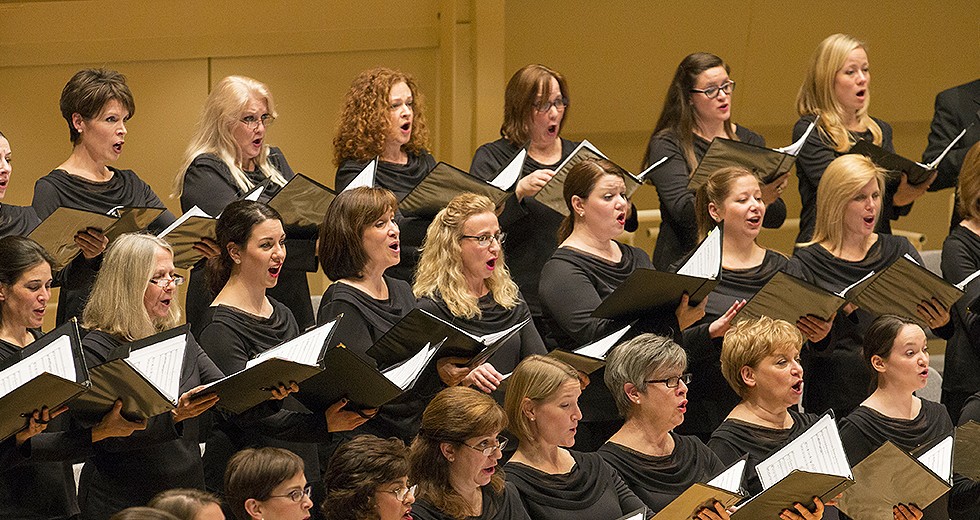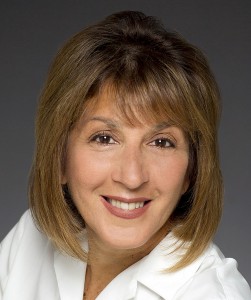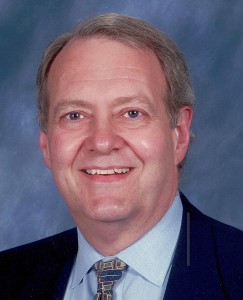
As just the second director of the world-renowned Chicago Symphony Chorus since its founding by Margaret Hillis in 1957, Duain Wolfe is well-known to Chicago audiences and the international choral community at large. In his post, he relies on the key contributions of his two longtime associate directors: Cheryl Frazes Hill and Don Horisberger. With nearly 80 years of combined experience with the chorus, they have served as an important bridge from the Hillis years to the present.
Frazes Hill, who has served since 2002 as director of choral activities at Roosevelt University’s Chicago College of Performing Arts, was a member of the chorus from 1976 through 1992. Hillis named her an assistant conductor in 1985 and promoted her seven years later to associate conductor, a position which at that time compelled her to step down as a singer. Horisberger began singing with the chorus in 1977 and remains a member. During his early years, he was appointed bass section leader and assistant to the German diction coach. In 1989, Hillis named him an assistant conductor, and he was elevated to associate conductor in 1998 under Wolfe.
“What’s really lovely is that when Duain came on [in 1994], I don’t think we expected that we would be asked to stay,” Frazes Hill said. “It’s like a new coach for the Bears or something. They bring in their own people. And I think we were really lucky that he had that confidence to allow us to stay. That was a big thing for him to keep on her [Hillis’] assistants and keep that continuity.”
In their roles as associate directors, the two assist Wolfe in preparing the chorus for its performances with the orchestra, lead sectional rehearsals where much of the nitty-gritty work is done, oversee preliminary auditions and handle a range of other administrative tasks. During rehearsals, they record the conductor’s directions concerning tempos, dynamics and phrasings, which are passed on to singers who might be absent, and they note any problems they detect that might escape the conductor when he or she is focused on something else. Finally, they serve as intermediaries for the singers, who are not allowed to interrupt rehearsals with questions because of the limited time available. “If somebody in the chorus has a question about a specific instruction on the page or they suspect there is a misprint, they come and ask us and we’ll figure out what is going on,” Horisberger said. “And if we can’t, we’ll go to Duain.”
Ahead of this month’s performances of Handel’s Messiah, Frazes Hill and Horisberger sat for an interview:
What sets the Chicago Symphony Chorus apart from other symphony orchestra choruses in the United States?
CFH: It was really one of the first symphonic choruses, with Margaret Hillis as its founder. There were very few symphony choruses as the time, and she was the one who established what became the standard for this country and actually, for the world, I dare say. She established it as a professional ensemble that would be comparable to the orchestra, and that standard has really remained intact for all these years.
How is the chorus different today than it was when it was founded in 1957?
CFH: We’ve been around for a lot of it, so we can kind of tell you.
DH: Every conductor is different and Margaret had a definite style in the way that she approached the chorus. She tended to be probably a little more didactic than a lot of conductors. She knew it took a certain time for pieces to get worked into the voice, and she would spend that time in rehearsal doing that. Over the years, especially since Duain has been here, he has treated it much more as a professional chorus and has said that the chorus is responsible for getting these things a little bit more quickly. So where Margaret had a certain number of rehearsals, Duain has fewer rehearsals. He just pushes things through more quickly.
CFH: I also think the level of the singers over the years — and you can see it in all the many choral organizations that have sprouted as a result of what was established here in Chicago — is higher than we had 20 and 30 years ago. They were wonderful then, but the kids coming in now, they can’t get in unless they have a certain level [of training], and the competition is far greater.
What kind of a musical background does a typical singer have?
DH: The vast majority of them now do have bachelor’s degrees and many of them do have master’s degrees also. And a very large number of those are actually in vocal performance. They are trained singers, and that is to be their career.
CFH: I don’t think we have anyone who hasn’t studied voice at the college level.
DH: In that sense, it really is true that the level of singer is just higher. At one time, I don’t think there were that many trained singers around. There were a lot of people who were church music directors and other instrumentalists, and they just happened to be able to sing, and it is really hard now for that type of person to even get in.
Do the singers have other jobs, too?
CFH: Yes, this is not a full-time job.
Would the other jobs be music-related or are there, say, lawyers who also happen degrees in voice?
CFH: We have a few of those. We have a couple of doctors. That’s really a rarity. Most of the singers we have are either teaching privately during the day or they are teaching high school or college music. We have rehearsals sometimes at 1 o’clock in the afternoon, so if they do have a job other than music, they have to have a very understanding boss.
DH: And there are other choruses in the area that pay, and many [chorus members] are in three or four different ensembles.
What is the average length of tenure for a singer?
CFH: We have some who have been here for 30-40 years. I think the average is maybe eight years.
Is it hard to find enough qualified singers for the ensemble?
CFH: I don’t think so. We hear many, many auditions. We have a lot of universities around here. People who move here who are professional singers from other areas. People who have had opera careers or have had singing careers but want to settle down and be in one place. We really get a variety of singers. There are some who come in who don’t have the background, but it seems like a lot of singers have a very full resume, and we seem to get them pretty regularly.
DH: I think we hear at preliminary auditions 150 or more, and maybe 30 or 40 of those make it to call-back auditions and, then, 5-10, if they are lucky, get hired.
How many weeks before a concert do rehearsals begin?
CFH: It depends on the piece. So for Messiah, we’ve only had a couple of weeks of rehearsals. Many of our singers know that piece, and so the time to get it ready is not as lengthy as when we did [Verdi’s] Macbeth, and we weren’t familiar with the opera. But we don’t go longer than about four or five weeks on a piece.
DH: Right.
CFH: And when we say “weeks,” we’re talking one night a week and maybe a sectional — maybe two nights a week max.
What has been the impact on the chorus since Riccardo Muti’s arrival?
DH: I feel like the chorus functions very much the way it did before. Maybe the only difference that I’m aware of is that Maestro Muti likes to do [conduct] a lot of the chorus works. It’s used to be that we would have years where the chorus would sing for five or six different conductors, and we typically sing now more for Muti.
CFH: It winds up that we do most of our work with him now.
It seems as if the CSO is doing more full-length concert operas than it was before.
DH: I don’t think it’s more. [Georg] Solti did it. [Daniel] Barenboim did it. We even did staged operas with Barenboim.
CFH: Many of these conductors really enjoy doing opera in the concert version, so through the years we have done a lot of opera.
DH: We’re doing more Verdi now.
CFH: And he’s [Muti’s] wonderful at it.
Is the holiday season the busiest time of the year for the chorus?
CFH: For many years — 20 years — we did this show called ‘Welcome Yule!’ that Duain conceived, wrote and conducted. That was a very busy pocket for us. Now we’re doing Messiah, which has the same amount of rehearsal time actually but fewer shows. The production staff was busier with “Welcome Yule!” There was a lot of stuff that went on with that piece.
What is the toughest part of your jobs?
CFH: That’s a good question. One of the tough parts is sometimes the music we get. Sometimes the scores are really difficult and learning them to the point that we can get up on a podium and conduct them and prepare them — that can be challenging.
DH: Also challenging in a different way is that if it is a conductor we haven’t sung for before, and Duain has maybe had some contact with him or her, but not necessarily enough to know what we’re doing, it gets a little nerve-wracking. You just have to be careful when you’re preparing that you allow more contingencies when it’s unknown.
CFH: Duain has to figure out almost a year out how many rehearsals he needs for something. Now if you have a piece that we are not familiar with, sometimes you don’t know how long it’s going to take, and so there are times when we wish we had one or two more rehearsals, and that’s when the intensity [ratchets up]. It’s not a relaxing environment. It’s all very time-limited. It’s not like in the university where I can schedule an extra rehearsal or work late. You can’t do that with professionals in a union situation. We have a clock and they take X number of breaks, and if you don’t get it done, then it’s not done and that’s a problem. So I think time is the hardest part of our job.
What’s it like to work with Duain Wolfe?
DH: He’s actually a very good boss.
CFH: He’s a perfectionist, and he puts that standard on himself more than anybody else and so everybody who works for him, we all have to be at that level.
DH: It’s almost a mixed blessing in a way, but he gives you a lot of leeway.
CFH: A lot of rope to hang yourself.
(Both laugh.)
CFH: He’s very collegial. If we sit down and we talk about something, he respects us and he listens to us, and we work things out together. A lot of people in his position wouldn’t do that.
Kyle MacMillan, former classical music critic of the Denver Post, is a Chicago-based arts journalist.
TOP: The Chicago Symphony Chorus performs Handel’s Messiah. | Todd Rosenberg Photography 2015

